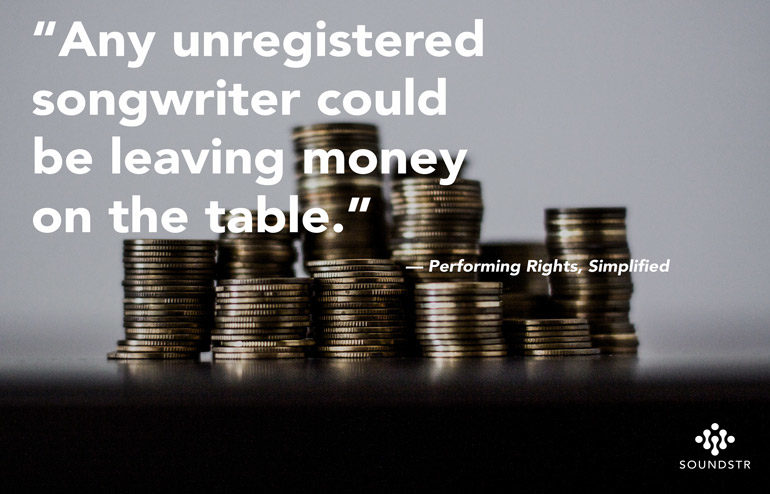Calling all songwriters: we need to have an important discussion about performing rights. We’ll try to keep it simple, but this is important – so listen up.
There are a LOT of misconceptions about this part of the music industry. “What are performing rights fees? Aren’t performing rights just for cover bands? You have to be popular to make money from them, right? Where does this check in my mailbox come from and why am I receiving it?” These are all common questions from songwriters.
We’re here to set the record straight, once and for all. What you might not know could be holding back your career and keeping you from collecting royalties you have earned.
1. What Are Performing Rights?
Let’s start with the basics:
Performing Rights – are the right to perform music in a public setting. This can be via radio broadcast (terrestrial), television, digitally or in a real-world business or venue.
Performance – the use of a song (“work”) requires the user to pay the songwriter or publisher.
Songwriter – is a composer and lyricist (sometimes the same person, although these can be different parties).
Publisher – is the individual or company that controls the payment of the song. The distribution of the payment to the respective party is a royalty.
2. Who Is Responsible?
Performing Rights Organizations (“PROs”) collect performing rights fees from music users. In the US the PROs are ASCAP, BMI, SESAC and Global Music Rights. There are ~50 PROs worldwide. In order for a songwriter or publisher to collect royalties from a PRO, they have to register with one of these organizations. ASCAP and BMI are open to the public; SESAC and GMR require a private invitation. You must choose one based on your country of origin and the available PRO’s open registration.
3. Why Are They Necessary?
Copyright law governs performing rights and these organizations. The law protects the creator of the song and lays the framework for the songwriter to be paid for the use of their hard work. So if a radio station, TV network, business or venue wants to publicly broadcast music, they must pay for that right (pay the songwriter) according to copyright law. If you do a job, you should get paid for that job. Songwriters are no different. PROs issue licenses for the right to use music and collect fees for all music used, regardless of whether the work is a cover or original song. The PROs then distribute royalties to songwriters and publishers. (More on this in the next installment: Performing Rights, Simplified P2: The Money.)
It is important to note that these laws are old (100 years!) and in the midst of big changes. (Hint: check out Performing Rights, Simplified P3: The Problem & Solution.) Performing rights are a major part of the music industry’s revenue stream.
4. How Does A Songwriter Access Them?
A composer of a song registers with a PRO (only one) as the songwriter. Registering as a songwriter with a PRO is free. If the songwriter and the lyricist are separate people, they would need to register their own accounts. After registering as a songwriter, an artist needs to define who their publisher will be. A songwriter can either register as their own publisher or work with a third-party publishing company, which is typically through invitation. Registering as a publishing company will most likely have an associated fee, but is necessary to collect publishing fees. PROs split most royalties 50/50 to songwriters and publishers (unless parties agree otherwise). A songwriter that does not have an associated publisher – even if it is themselves – is leaving money on the table.
5. When To Register
Any songwriter that has released music or plans to should register with a PRO. With so many distribution channels, it is impossible for a songwriter to track all performances of their music. A TV network on the other side of the country (or world) could already feature one of your songs in a show. You could be a fan favorite on a jukebox at a bar in your own backyard. Any unregistered songwriter could be leaving money on the table.
All songwriters should register with a PRO. Songwriters should educate themselves on how this industry works. Basic information could be the difference in collecting the royalties you’ve earned.
Stop leaving money on the table, and start learning how you can get the most out of your music. Find out more in our next article, Performing Rights, Simplified P2: The Money.



July 27, 2016
[…] Rights Organizations (ASCAP, BMI, SESAC and GMR, “PROs”), read this now. If you are familiar with the PROs and what they do, keep reading. The Consent Decree […]
July 27, 2016
Thank you for the repost!
July 27, 2016
[…] are not familiar with Performing Rights Organizations (ASCAP, BMI, SESAC and GMR, “PROs”), read this now. If you are familiar with the PROs and what they do, keep reading. The Consent Decree decisions […]